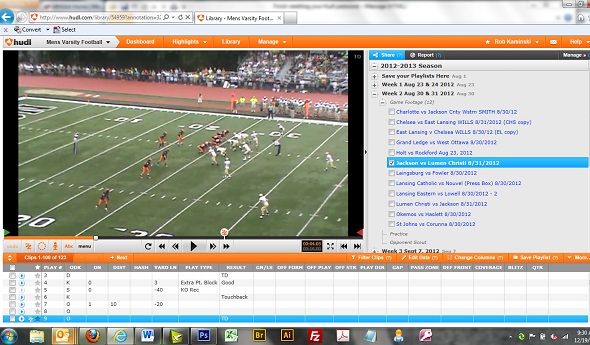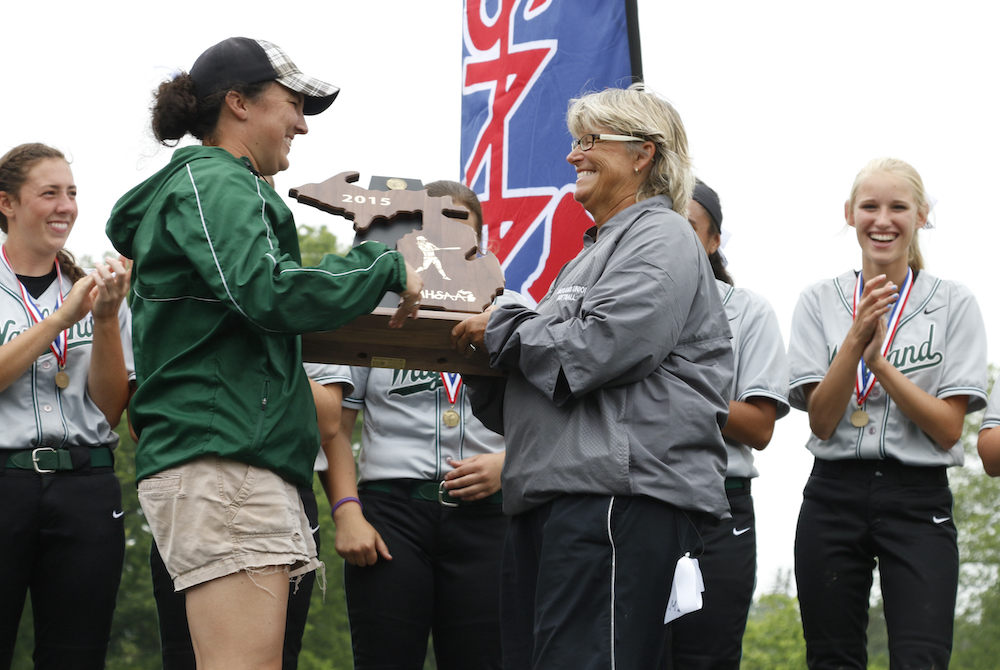
The Changing Face(book?) of Coaching
March 26, 2013
By Rob Kaminski
MHSAA benchmarks editor
From online video exchange programs such as hudl.com to social media platforms like Facebook, Twitter, and LinkedIn, the face of coaching and communicating with teams is ever-changing. How much is too much, and how are the new tools being used by the old guard?
With increasing frequency, today’s coaches are turning to technology to assist in their endeavors, particularly in video review and data compilation, as the number of programs available to them seems to grow on a daily basis.
Among the recent leaders, hudl.com seems to have won the favor of football coaches across the state, reducing video exchange and study to a couple clicks of the mouse.
Several members of the MHSAA Student Advisory Council report that their football coaches use the web-based program, and even local officials associations are using it for film study.
Similar programs are making it easier for today’s coaches to analyze data and compile statistics as well.
“The dispensing of information is much quicker than it used to be,” said Marshall bowling coach Sue Hutchings. “We use a scoring software for our stats.”
In more “visual” sports such as competitive cheer, online video is now essential.
“Video playback and feedback to athletes has helped the sport 10-fold,” said Middleville Thornapple-Kellogg coach Abby Kanitz.
In some cases, coaches are taking the lead on such initiatives.
“I run the MISCA (Michigan Interscholastic Swim Coaches Association) website and receive plenty of positive feedback about us posting meet results and top times reports,” said Bloomfield Hills Andover coach David Zulkiewski. “I also visit MHSAA.com weekly. Since I run the MISCA website, I want to make sure I have accurate and up-to-date information posted.”
Technology has also made the world a bit “greener” even in the small corner that is interscholastic athletics. From the required MHSAA rules meetings moving to an online format, to volumes of data now stored on flash drives rather than in file cabinets, coaches are realizing savings in both time and cost.
“The current state of track and field and cross country is so much more manageable than when I began,” said East Kentwood’s Dave Emeott. “I remember compiling actual papers from all over the state to keep track of the opposition, and now thanks to Athletic.net we have this access at the tip of our fingers. These programs have also replaced nights spent inputting data and record-keeping. I am sure I have replaced all that time elsewhere, but it is probably spent with kids and not with data.”
With the saturation and availability of these reports around the clock also comes temptation for those who are driven, and even obsessed, with such numbers. Coaches can rank near the top of that list.
“Technology can be extremely helpful and time-saving for coaches and teachers,” said Grand Haven wrestling coach James Richardson. “But, the disadvantage is the coaches and athletes have a more difficult time getting away from the sport, as we have access to so much information, and others have more access to us. This can lead to too much time being devoted to our sport.”
It also might even take some of the fun out of the actual competition.
“I think the one negative side of technology is the lack of the unknown,” Emeott said. “There was a day when we would enter a meet and not really know how the day would turn out. Now I have most meets scored within 10 points the day before we arrive.”
At times, such advance information also can lead to overconfidence heading into competition.
“Currently the MHSAA Final draw is posted online, and my players often see it and draw their own conclusions before I have a chance to talk to them about it,” said Allegan tennis coach Gary Ellis. “In the past, I was able to present their draw in the light in which I wanted them to see it.”
Another side effect is the indirect push to play beyond high school.
“There is a lot more social promotion and glamourizing of the athletes,” said Mike Van Antwerp, Holt lacrosse coach. “The recruiting pressure has increased tremendously, which is causing kids to commit earlier and go to great lengths to have a chance at being recruited.”
The world has indeed become a smaller, more familiar place. Not only can students and coaches learn pertinent statistics relating to any given opponent, they can also learn personal information about their competition through the deluge of social media vehicles.
It is in this realm where the greatest divide exists between coaches and their athletes when the subject of technology comes up.
Several members of the MHSAA Student Advisory Council indicate that their coaches do not use social media to assist with the daily activities involved with their sport, while others are but only on a limited basis.
It’s not that the coaches don’t know about Facebook, Twitter, LinkedIn, or the other platforms. More likely, they are all too well versed in the abuses of such mediums by young adults not yet ready to understand the lasting ramifications of a random tweet or damaging photo.
“We have specific rules for use of cell phones at practice, games, in the locker room, etc.,” said Diane Laffey, athletic director and coach at Warren Regina. “We also have a form for parents to sign if they want the coach to be able to text their daughter about practice or game cancellations or changes. We stress that the texting only be for necessary things, and the parents are to give permission.”
Safeguarding against the misuse of handheld devices is becoming as commonplace as handing out uniforms prior to the season.
“By rule, our players aren’t allowed to bring electronic devices to the court with them. We restrict cell phone usage at practice,” said Portage Central tennis coach Peter Militzer. “Players must ‘friend’ the coach on either Facebook or Twitter, and I monitor their activities to make sure their language and behavior meets our standards. We restricted a player’s opportunity to play on varsity last season due to excessive use of crude language and an offensive user name on Twitter.”
PHOTO: This is a screenshot from Hudl.com, an online service used by high school football coaches for video analysis and archiving.

COMMENTARY: Public Act 184 a Real Loser for School Sports in Michigan
By
Mark Uyl
MHSAA Executive Director
October 20, 2022
There is a crisis in Michigan schools today that centers on one problem:
Not having enough people.
In discussions with school district personnel, we are being told there has never been a more difficult time for finding people than today. All of us are searching high and low to find coaches for athletic teams, and officials, referees and umpires to administer those games in an orderly and safe way. Dig a little deeper, and school districts are desperate to find those willing to serve as substitute teachers and bus drivers.
Because of this current reality, we continue to be dumbfounded over the approval of Public Act 184 this past summer. This created a new set of retirement rules stipulating that a retiring teacher or administrator cannot be rehired to serve as a coach until after a nine-month waiting period. Even more frustrating: Individuals who had served as high school coaches for many years, who retired from the classroom last June but had planned to keep coaching for a few more seasons, are being told they cannot do so. Those coaches are sidelined, and for no sensible reason.
Cheri Ritz has been the varsity softball coach at Wayland High School since 1995. Cheri has won numerous championships, and has been a model coach and great leader of students throughout her career. Cheri retired as a teacher in June and planned to keep coaching the softball team for a few more years, making a small fraction of what her classroom salary was before retirement. Under the “old” retirement law, Cheri could have retired in June and been detached from the district for 30 days, and then returned and worked for the district in any capacity as long as she was making less than 30 percent of her compensation at the time of her retirement. Under PA 184, this scenario can no longer happen.
In the state of Michigan, we have hundreds of recently-retired school people who want to continue to be some of our best coaches, making pennies on the hour for their time. Now they simply aren’t allowed to do so because of a law that had no intention of impacting coaches and school sports. Cheri is just one example. The same issue has found several more longtime, successful coaches including Northville’s golf coach Chris Cronin and cross country & track field’s Steve Porter at Milan High School.
For the past few months, the MHSAA has met with the Office of Retirement Services, representatives from the Governor’s office and even the bill sponsor of PA 184. Every single conversation revealed the fact that coaches were not even part of the discussion when this new retirement law was passed. In other words, recent retirees continuing to coach were not the issue, but yet this new law now treats coaches as some sort of enemy with zero phase-in period, modification or even the ability to seek a waiver of this new law which became effective immediately on July 25, 2022. We have tried to work within the system to seek some commonsense approaches and solutions to this problem, but to no avail as of yet.
We need your help. We need you to contact the Governor’s office and your State Representative and State Senator’s offices. Let them know PA 184 needs to be fixed now. We need to find a way to let these individuals continue to coach and lead our student-athletes. Let them know our kids cannot play their games without individuals who want to coach, and let them know our kids will miss out on learning valuable life lessons if these coaches are not allowed to continue.
And let them know that PA 184 could not have been passed at a worse time given our most valuable resource – people – is at an all-time low.
PHOTO: Wayland softball coach Cheri Ritz, front right, accepts the Division 2 championship trophy in 2015.

